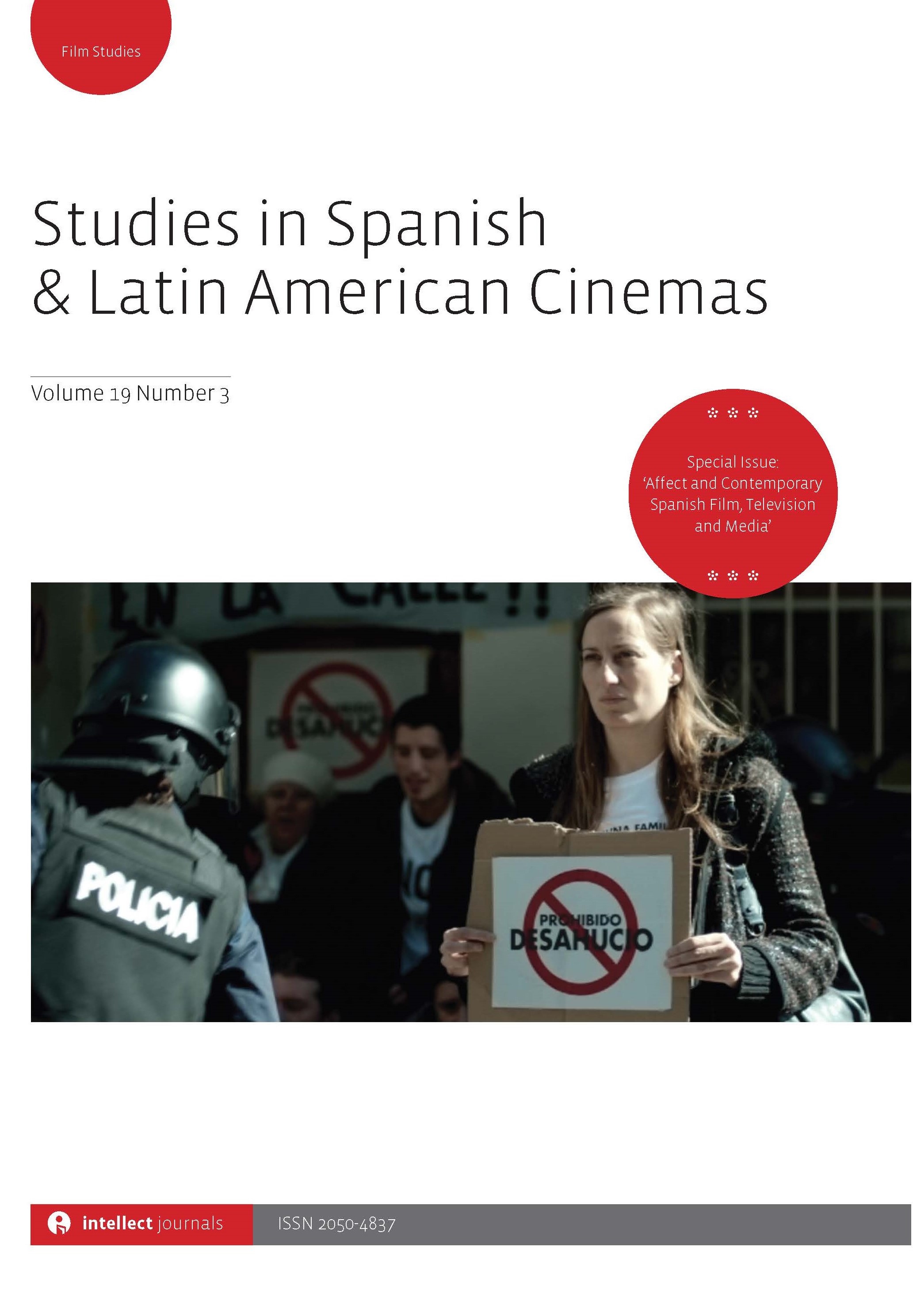- Home
- A-Z Publications
- Studies in Spanish & Latin American Cinemas
- Previous Issues
- Volume 12, Issue 2, 2015
Studies in Spanish & Latin American Cinemas - Volume 12, Issue 2, 2015
Volume 12, Issue 2, 2015
-
-
Backstage pass to the city: The soundscape of Suite Habana
More LessAbstractThe objective of this article is to underscore the significance of sound for the full appreciation of film through an analysis of the diegetic and non-diegetic sounds and music of Suite Habana/Havana Suite (2003), by Fernando Pérez, a film that has not yet been interpreted from this perspective. The soundscape of Suite Habana offers a compelling understanding of contemporary urban life and the political and cultural transformations that have occurred in Cuban society. From everyday sounds of cooking, cleaning and daily circulation through the city, to songs and compositions by well-known composers and performers, urban sounds in the film present a profound interpretation of the Cuban capital. Despite its similarities with the city symphony film genre of the 1920s, Suite Habana’s focus on the human side of the urban experience sets this film apart from these earlier examples. Drawing also from experimentation in documentary film in early Revolutionary Cuba, Pérez’s film carefully interweaves everyday sounds to highlight the materiality of urban life, while the incorporation of specific musical pieces and performers underscores the impact of historical changes for the island.
-
-
-
Reordering (social) sensibilities: Balancing realisms in Neighbouring Sounds
More LessAbstractThis article treats the film O Som Ao Redor/Neighbouring Sounds (Mendonça Filho, 2012), one of the most innovative Brazilian films in recent years. The film is examined as an example of a Latin American film that renovates film form and contributes to new debates concerning conceptual and sensorial realism. The film intervenes at sensory thresholds, combining realist and surrealist strategies and a hypo-real soundscape to reflect on deep social disjunctions and an uncertain social landscape. Neighbouring Sounds appears to portray the everyday activities of residents in an upper-middle class neighbourhood in Recife but it subtly reveals feelings of ennui and fear to offer a broader reflection on tensions between interdependent social classes and debates concerning contemporary social transformation. In its reflection on changing social sensibilities, Neighbouring Sounds develops a particular aesthetic and political liminality and plays on tensions between the visible and invisible.
-
-
-
A different Mexican postcard: Fernando Eimbcke’s Lake Tahoe (2008)
More LessAbstractThis article examines the ways in which the screen aesthetics of Fernando Eimbcke’s Lake Tahoe (2008) creates a sympathetic portrait of the contemporary middle class in Mexico. Considering first the deployment in Eimbcke’s work of the same critical closeness and distance underpinning the chronicles of distinguished Mexican writer Carlos Monsiváis, the article then analyses: Eimbcke’s formal style, which foregrounds a combination of static camerawork and narrative ellipsis to produce specific affective relations on-screen and an ironic address to the audience; his chronicle of the Mexican working and middle class in a beach town in the Yucatán; and the implications of the visual humour and nostalgia with which he approaches the protagonist’s process of mourning.
-
-
-
Places of memory in the new millennium: British influence on Spanish transnational heritage cinema and television
More LessAbstractA revival of Spanish heritage productions has taken place in the new millenium, with films such as Las 13 rosas/13 Roses (Martínez Lázaro, 2007) and La voz dormida/The Sleeping Voice (Zambrano, 2011) and successful TV series such as Cuéntame cómo pasó/Tell Me How It Happened (2001–2011), Amar en tiempos revueltos/Loving in Troubled Times (2005–2012/2013–), La señora/The Lady (2008–2010) and 14 de abril, la República/14th April, the Republic (2011). This article views this development against the backdrop of British heritage productions in film and television during the crucial Thatcher years. Borrowing conventions from this genre, Spanish heritage productions emphasize their ‘quality’ while including a component of revisionist nostalgia in the narratives. The aim of this article is thus to examine how the generalized wilful nostalgia of the last decades is reflected in Spanish cinema and television, which reproduce local historical events in global formats.
-
-
-
Report on Morelia International Film Festival, 17–26 October 2014
More LessAbstractThis article reports on the twelfth edition of the Morelia International Film Festival, which took place from 17 to 26 October 2014. It begins by recounting the debates held at the Encuentro de Realizadores Mexicanos, an industry forum that gave voice to directors, archivists and critics from Mexico and beyond and focused on such questions as the divide between art movies and commercial cinema. The report goes on to analyse the Mexican fiction features shown at the festival, all national premieres. It argues that there were three main themes: LGBT issues, ageing and the reaction against the slow or observational cinema that was previously dominant at this and other festivals.
-
-
-
Book Reviews
More LessAbstractSpanish Cinema 1973–2010: Auteurism, Politics, Landscape and Memory, Maria M. Delgado and Robin Fiddian (eds) (2013) Manchester: Manchester University Press, xviii + 262 pp. ISBN: 9780719087110, h/bk, £65
The Three Amigos: The Transnational Film-Making of Guillermo del Toro, Alejandro González Iñárritu and Alfonso Cuarón, Deborah Shaw (2013) Manchester: Manchester University Press, 288 pp., ISBN: 9780719082702, h/bk, £70
Julio Medem, Rob Stone (2012) Manchester and New York: Manchester University Press, 236 pp., ISBN: 9780719072017, p/bk, £14.99
Experimental Latin American Cinema: History and Aesthetics, Cynthia Tompkins (2013) Austin: University of Texas Press, 306 pp., ISBN: 9780292744158, h/bk, $60.00
Spain On-Screen: Developments in Contemporary Spanish Cinema, Ann Davies (ed.) (2011) New York: Palgrave MacMillan, 200 pp., ISBN-13: 9780230236202, h/bk, £56
Gynocine: teoría de género, filmografía y praxis cinematográfica, Barbara Zecchi (ed.) (2013) Zaragoza: Prensas de la Universidad de Zaragoza, 328 pp., ISBN-13: 9788415770855, p/bk, £17.30
Desenfocadas: Cineastas españolas y discursos de género, BARBARA Zecchi (2014) Barcelona: Icaria Editorial, 246 pp., ISBN-13: 9788498885682, p/bk, £17.68
Transition Cinema: Political Filmmaking and The Argentine Left Since 1968, Jessica Stites Mor (2012) Pittsburgh: Pittsburgh University Press, 264 pp. ISBN: 9780822961918, p/bk, $22.46
-
Most Read This Month


